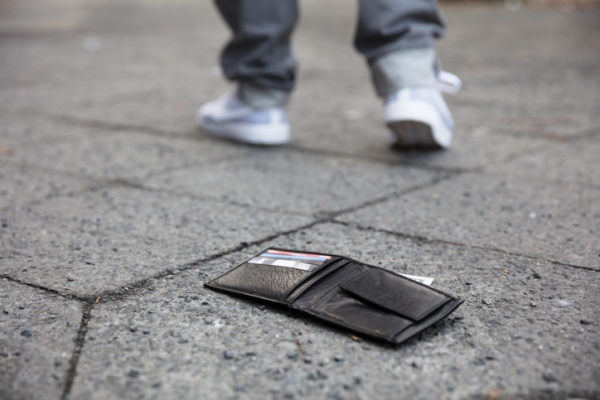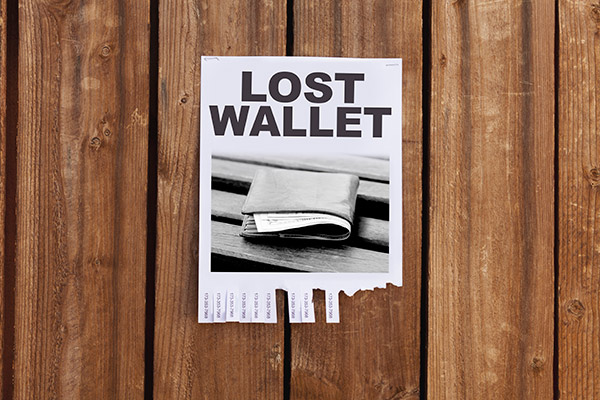It’s a horrible feeling: You reach for your wallet and find … nothing. Whether the wallet was lost or stolen, you’re now missing cash, credit cards, identification and anything else you keep in there.
To make things even more stressful, it can be a short leap from a stolen wallet to credit card fraud or other forms of identity theft. One Department of Justice report said that of the many identity theft victims who had some idea how their information was obtained, a full 20 percent believe it was lost or stolen from a wallet or checkbook.
But you can help minimize the potential damage when your wallet does go missing, says Paige Schaffer, president and COO of Global Identity & Digital Protection Services at Generali Global Assistance. She recommends keeping the following strategies in your back pocket.
1. Call Your Credit And Debit Card Companies
Do this immediately. Tell them you lost your wallet or that it was stolen, so they can cancel the card and issue you a new one. Start with your debit card, as your level of liability depends on how quickly you call in the incident. With credit cards, if you report the loss before the card is used, you won’t be responsible for any charges you didn’t authorize.
2. Set Up A Fraud Alert
Thieves could use your information to open new credit card accounts or loans; setting a fraud alert with the credit bureaus means that lenders and creditors have to take extra measures to verify your identity. You only need to contact one of the three major credit bureaus; they’ll notify the other two. And check your credit report a few times a year for fraudulent activity.
3. File A Police Report
Filing a report with the police helps prevent fraud when you’ve lost your wallet. Even if you don’t believe the cops will find the thief, file a report. This creates a paper trail, which can be instrumental in disputing any potential fraud with creditors, credit bureaus and insurance companies. Also let the cops know if you had a spare house key in your wallet. (Consider changing the locks to your home as well.)
4. Change Your Passwords
Losing your wallet could compromise your e-mail, credit card or bank accounts. Choose new, strong passwords to protect your personal information. Be sure to pick new secret questions and answers, too.
5. Call The DMV
Report your missing driver’s license to your local DMV. It’s illegal to drive without one, though some states may allow you to use your driving record as proof of a valid license. Ask what the specific state requirements are to replace the license.
6. Contact Your Insurance Companies
If you’ve lost your wallet, it’s likely your medical insurance card disappeared with it, so report the loss to the insurer. They may or may not issue a new number; either way, check your explanation of benefits summaries regularly for fraudulent usage. Also notify your auto insurance company if you’ve lost your card. However, you can avoid this step by storing your proof of auto insurance digitally—a feature available on the GEICO Mobile app.
Be Proactive
Before your wallet goes missing, some proactive measures can help keep a bad situation from becoming worse, says Schaffer.

- Keep your contact information in your wallet—well-meaning people who find it can’t return your possessions if they don’t know how to reach you.
- Record all the contents in your wallet, including license and credit card numbers (of course, don’t keep the information in your wallet!).
- Purchase identity theft protection before any problems occur. This will monitor your credit and help restore your identity if your wallet does fall into the wrong hands.
Also, do not carry the following in your wallet:
- Your social security card or a list of passwords, which could allow crooks to compromise your identity very quickly.
- More than two credit cards—this will make for more work if you lose your wallet.
- A house key, since your address is on your license and can be discoverable online.
Replacing a wallet is easy; restoring your identity can be much harder. Purchasing identity theft protection through the GEICO Insurance Agency can help. Choose the plan option that fits you best—whether you’re an individual, a couple or a family.
Read more: Keep an eye out for these warning signs of identity theft.
By Jennifer Tzeses










Robert L Doxie Jr. says,
Excellent advice. “Outstanding, thank you”
LEROY PRESCOD says,
I HAVE GOT THE NECESSARY INFORMATION I NEEDED. VERY HELPFUL
Mark says,
Of course you don’t always have to carry a wallet around with you. My ‘wallet’ is my DL, my debit card in a protective sleeve and some cash. Have not use a wallet per-se in years. I carry only what I need.
Bhadra Panta says,
Thank you GEICO ! You are really proactive and helping to your patrons. Thank you so much.
Stephen McGreevy says,
Memorize your Driver’s License Number(!): I have found on one occasion in Inyo County, Calif., (Inyo SO) that having your Drivers License number memorized and then told to an officer (also keep your DL # in a hidden place in your vehicle until memorized) can go a long ways to drive back home legally, and/or will be even “accepted” as ID (they can often look up your lic. # and obtain a photo of yourself while the officer is in their vehicle), also by having your DL number in this manner. If your vehicle lic. # matches your name from the DL # you give the police along with your full identity and DOB (birthdate), and explain you just lost your License and wallet/purse, and you will likely be given permission to continue and perhaps issued a temporary “license” in the form of written permission just-in-case one gets pulled-over, etc.
Of course this information will not work in all jurisdictions, and as such it is a good idea to find out if so.
Steve
Percy Jimenez says,
Excellent reminder
PAULETTE says,
Thank you at Geico for the inf
Gloria Hall says,
THANK YOU FOR SHARING